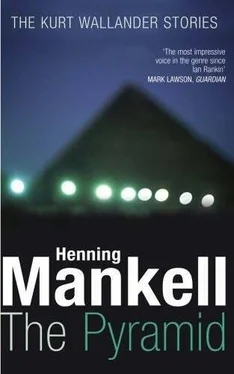Blomell was right. Wallander should have thought of it himself. But he did not say this.
'We're already on it,' he said instead.
'That was all,' Blomell said. 'How was your father?'
'He told me he's taking a trip to Egypt.'
'That sounds like a wonderful idea.'
Wallander didn't answer.
'It's getting colder,' Blomell concluded. 'Winter is on its way.'
'Soon we'll have snowstorms upon us,' Wallander said.
He went back to the kitchen, thinking about what Blomell had said. Martinsson or someone else could get in touch with colleagues in Tomelilla and Sjöbo. Maybe also Simrishamn to be safe. It might be possible to pinpoint the plane's route and destination by looking for people who were early risers and who had noticed an engine noise overhead, twice in a row if they were lucky. Surely there were still some dairy farmers around who were up at that time of day? But the question remained. What had the two men been doing on their flight? And why had the plane lacked all signs of identification?
Wallander quickly leafed through the paper. The Labrador puppies were still for sale. But there was no house that caught his eye.
Wallander walked in through the doors of the station a little before eight o'clock. He was wearing the sweater he reserved for days of up to five degrees below zero. He asked Ebba to arrange travel insurance for his father.
'That has always been my dream,' she said. 'To go to Egypt and see the pyramids.'
Everyone seems to be envious of my father, Wallander thought as he poured himself a cup of coffee and went to his office. No one even seems surprised. I'm the only one who's worried that something will happen. That he'll get lost in the desert, for example.
Martinsson had placed a report on his desk about the accident. Wallander eyed it quickly and thought that Martinsson was still far too verbose. Half as much would have been enough. Once Rydberg had told him that that which could not be expressed in a telegram format was either poorly conceived or completely wrong. Wallander had always tried to make his reports as clear and brief as possible. He called Martinsson and told him about his conversation with Björk the day before. Martinsson seemed pleased. Then Wallander suggested a meeting. What Blomell had said was worth following up. Martinsson managed to locate Hansson and Svedberg at half past eight. But Rydberg had still not arrived. They filed into one of the conference rooms.
'Has anyone seen Nyberg?' Wallander asked.
Nyberg walked in at that moment. As usual, he appeared to have been up all night. His hair was standing on end. He sat in his usual seat, somewhat apart from the others.
'Rydberg seems ill,' Svedberg said, scratching his bald spot with a pencil.
'He is ill,' Hansson said. 'He has sciatica.'
'Rheumatism,' Wallander corrected. 'There's a big difference.'
Then he turned to Nyberg.
'We've examined the wings,' the latter said. 'And washed away the fire-retardant foam and tried to puzzle the pieces of the fuselage back together. The numbers and letters had not only been painted over, they had also been scraped away beforehand. But that had only been partly successful, hence the need for paint. The people on board definitely did not want to be traced.'
'I imagine there is a number on the engine,' Wallander said. 'And of course not as many planes are manufactured as cars.'
'We're getting in touch with the Piper factory in the United States,' Martinsson said.
'There are some other questions that need to be answered,' Wallander went on. 'How far can a plane like this fly on one tank of fuel? How common are additional fuel tanks? What is the limit to the amount of petrol a plane of this type can carry?'
Martinsson wrote this down.
'I'll get the answers,' he said.
The door opened and Rydberg came in.
'I've been to the hospital,' he said curtly, 'and things always take a long time there.'
Wallander could see that he was in pain but said nothing.
Instead, he presented the idea of trying to find others who might have heard the engine noise. He felt a little guilty that he did not give Blomell credit for this insight.
'This will be like in wartime,' Rydberg commented. 'When everyone in Skåne walked around and listened for planes.'
'It's possible it won't yield anything,' Wallander said. 'But there's no harm in checking with our colleagues in nearby districts. Personally I have trouble believing it could have been anything other than a drug transport. An arranged drop somewhere.'
'We should talk to Malmö,' Rydberg said. 'If they've noticed that the supply seems to have increased dramatically, there could be a connection. I'll call them.'
No one had any objections. Wallander brought the meeting to a close shortly after nine o'clock.
He spent the rest of the morning concluding work on the assault case in Skurup and presenting the findings to Per Åkeson. At lunchtime he went downtown, had the hot-dog special, and bought some toilet paper. He even took the opportunity to drop by the state-run offlicence and buy a bottle of whisky and two bottles of wine. Just as he was leaving he bumped into Sten Widén on his way in. He reeked of alcohol and looked worn out.
Sten Widén was one of Wallander's oldest friends. They had met many years ago, united by their interest in opera. Widén worked for his father in Stjärnsund, where they had raised racehorses. They had seen each other less often the past few years. Wallander had started to keep his distance when he realised that Widén's drinking was getting out of control.
'It's been a while,' Widén said.
Wallander winced at his breath, which seemed to testify to many drinking bouts.
'You know how it is,' Wallander says. 'These things go in waves.'
Then they exchanged some neutral words. Both wanted to end the conversation as soon as possible. In order to meet under different, prearranged circumstances. Wallander promised to call.
'I'm training a new horse,' Widén said. 'She had such a bad name I managed to get it changed.'
'What is she now?'
' La Trottiata. '
Widén smiled. Wallander nodded. Then they went their separate ways.
Wallander walked back to Mariagatan with his bags. He was back at the station at a quarter past two. Everything still seemed deserted. Wallander continued to work through his pile of paper. After the assault in Skurup came a burglary in central Ystad, on Pilgrimsgatan. Someone had broken a window in the middle of the day and emptied the house of various valuables. Wallander shook his head as he read through Svedberg's report. It was unbelievable that none of the neighbours had seen anything.
Is this fear starting to spread even in Sweden? he wondered. The fear of assisting the police with the most elementary observations. If this is the case then the situation is far worse that I have wanted to believe.
Wallander struggled on with the material and made notes on who should be questioned and which searches should be made in the files. But he had no illusions that they would be able to solve the burglary case without a large dose of luck or reliable witnesses' accounts.
Martinsson walked into his office shortly before five. Wallander saw that he was starting to grow a moustache, but he said nothing.
'Sjöbo actually did have something to say,' Martinsson began. 'A man had been out looking for a lost bull calf all night. God only knows how he thought he was going to find anything in the dark. But he called the police in Sjöbo that morning and said he had seen strange lights and heard an engine noise shortly after five.'
'Strange lights? What did he mean by that?'
'I've asked the Sjöbo colleagues to interview the man in more detail.
Fridell was his name.'
Wallander nodded.
Читать дальше












